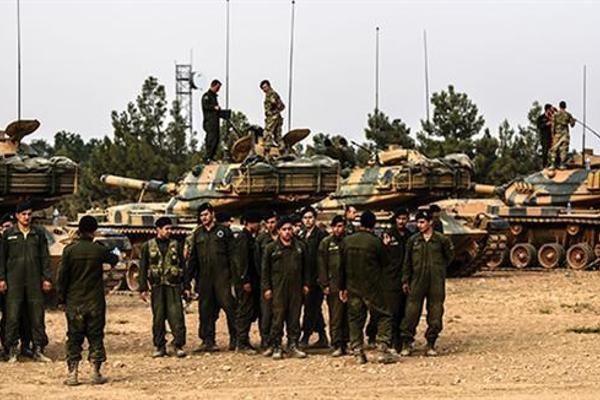Turkish forces shell Syrian Kurdish YPG group near Jarablus
GAZİANTEP / ANKARA


This picture taken around 5 kilometres west from the Turkish Syrian border city of Karkamis in the southern region of Gaziantep, on August 25, 2016 shows Turkish Army soldiers gathering next to tanks
The Turkish military, which has entered Syrian town of Jarablus as part of the Euphrates Shield operation to back Syrian rebels sweep Islamic State of Iraq and the Levant (ISIL) militants off the border, hit late on Aug. 25 the Syrian Kurdish militants by artillery fire.The Turkish forces hit a People’s Protection Units (YPG) unit, after marking them nearing the south of Jarablus from the north of Manbij, another Syrian town recently cleared off ISIL militants by them, the state-run Anadolu Agency reported.
Turkish forces opened fire on YPG militants from 6:00 pm by local time after intelligence showed they were advancing despite a promise by the U.S. that the Kurdish militia would retreat, Anadolu said.
The shelling by howitzers occurred near Manbij, an area controlled by the U.S.-allied YPG, after the militants did not heed a warning from Turkish forces, CNN Türk said.
Jarablus lies about 40 kilometers north of Manbij.
Earlier in the day, the Kurdish Democratic Union Party (PYD), said its armed wing YPG was leaving Manbij to prepare for another move on ISIL.
The YPG, considered by Ankara to be the Syrian affiliate of the outlawed Kurdistan Workers’ Party (PKK), said its forces had returned to their bases after “successfully completing” the mission to capture Manbij.
In a statement, the YPG said military command and all YPG-held positions had been handed to the allied Manbij Military Council, while civilian control was handed to a civilian council on Aug. 15.
U.S. Secretary of State John Kerry held a telephone conversation with Turkish Foreign Minister Mevlüt Çavuşoğlu on the morning of Aug. 25 to discuss the withdrawal of the Syrian Kurdish forces, Turkish diplomatic sources told the Hürriyet Daily News on Aug. 25.
“Kerry emphasized that the PYD/YPG forces have been withdrawing to the east of the Euphrates,” said a senior Turkish official.
The YPG, a part of the Syrian Democratic Forces (SDF) alliance, has been a partner in the U.S.-led campaign against ISIL in Syria.
A spokesman for the coalition also confirmed that the SDF had withdrawn east to prepare for “the eventual liberation” of Raqqa, ISIL’s main city in Syria. Some forces remained in Manbij to finish clearing the area, the spokesperson added.
“We have made it absolutely clear that they [pro-Kurdish forces] must go back across the [Euphrates]. They cannot and will not, under any circumstances, get American support if they do not keep that commitment,” Biden had told reporters at a joint press conference with Prime Minister Binali Yıldırım on Aug. 24 in the Turkish capital.
“We have a full agreement with the United States on what’s happening, which is that the PYD shouldn’t cross west of [the] Euphrates or engage in activities west of the river,” Yıldırım said at the same event.
Meanwhile, a total of 350 soldiers from the Turkish Armed Forces are taking part in the “Euphrates Shield” operation launched on Aug. 24 to back Syrian rebels’ bid to clear ISIL from territories bordering Turkey, CNN Türk reported on Aug. 25.
Some 200 soldiers from mechanized units and 150 Special Forces soldiers are involved in the operation, which is still ongoing after it secured its first aim of liberating the Syrian town of Jarablus from ISIL, some 14 hours after the operation began.
The ground forces and Ankara-backed Free Syrian Army (FSA) fighters are supported by intense air operations by the international anti-ISIL coalition forces.
After the capture of Jarablus, Syrian rebels reportedly carried out careful explorations of the town to clear mines and explosive traps set up by ISIL militants before their retreat.
Along with the coalition air support, 17 Turkish planes are reportedly taking part in the operation, including 11 F-16s, two F-16s, a tanker aircraft for the jets’ fuel delivery, one AWACS, and two rescue planes.
Turkey sent more tanks into northern Syria on Aug. 25.
Turkey’s Special Forces commander, Lieutenant General Zekai Aksakallı, conducted inspections in Jarablus on Aug. 24.
Aksakallı was recently promoted to head the Special Forces in the first Supreme Military Council (YAŞ) meeting to be held since the thwarted coup attempt of July 15.
In his former capacity as major general, he had played a key role in the defeat of the attempted coup after realizing that his deputy, Brigadier General Salih Terzi, was an active member of the junta.
